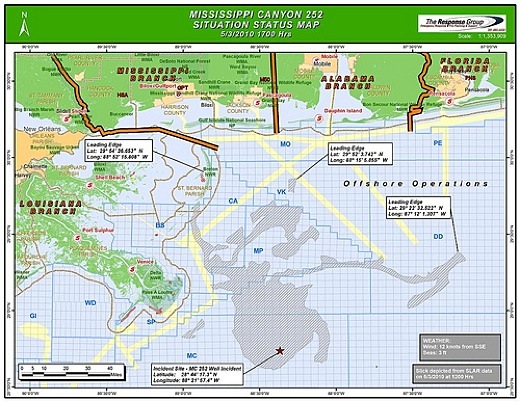SUBHEAD: The British Petroleum oil slick in the Gulf of Mexico could trigger 'double-dip' recession in the USA.
From: http://news.yahoo.com/s/afp/20100503/bs_afp/usblastoilenergypollutioneconomy
The massive oil slick threatening the Gulf of Mexico's coastline could wreck the US economy's fragile recovery and lead to a "double-dip" recession, an investment firm warned Monday.
A market commentary from Cumberland Advisors said the bill from the Deepwater Horizon disaster may ultimately run into hundreds of billions of dollars and leave an economic impact that will be felt for a generation.
Cumberland chief investment officer David Kotok said in a commentary titled "Oil Slickonomics" that the spill had left three likely scenarios for the future: "bad, worse, and ugliest."
Under the worst case scenario, it would take months to plug the ruptured well spewing an estimated 210,000 gallons of oil into the sea every day, Kotok said, leaving a clean-up operation which would take a decade to complete.
"The Gulf becomes a damaged sea for a generation. The oil slick leaks beyond the western Florida coast, enters the Gulfstream and reaches the eastern coast of the United States and beyond," Kotok wrote. "Monetary cost is now measured in the many hundreds of billions of dollars."
Kotok argued that regardless of when the well is plugged, the disaster would lead to an increase in federal deficit spending measured in "tens, and maybe hundreds, of billions as emergency appropriations are directed at larger and larger efforts to clean up this mess."
"At the same time, federal and state revenues tied to Gulf-region businesses will fall," Kotok wrote.
"We do not expect the Fed to raise interest rates at all for the rest of this year, and maybe well into next year. We expect to see the deterioration of the economic statistics for the US to reveal the onset of this oil-slick crisis in May, and the negative impact will intensify during the summer months.
"A 'double-dip' recession probably has been made more likely by this tragedy," he concluded.
Deep Water Horizon Briefing
Coast Guard Commandant Thad Allen via conference call 1 May 2010 -
(http://www.deepwaterhorizonresponse.com/go/doc/2931/535447)
Transcript from press briefing on ongoing response to oil spill.
...ADMIRAL ALLEN: I didn’t say estimates are impossible. Estimates are what they are -- the precision. I think in this case, the difference between 1,000 barrels a day and 5,000 barrels day -- if you look at potentially this can go on for 45 or 90 days if we don't cap it, the rate is less important than the accumulation of oil on the surface, and at that point, really it would be an undetermined amount of oil that's in the reservoir that's 18,000 feet below the wellhead.
That's the reason the focus has got to be to stop it at the source. We can talk about the difference between a thousand and 5,000 barrels a day, but quite frankly, the continued leakage of anything for that period of time is going to cause an extraordinary amount of problems for us. We've got to attack this on the surface.
So the estimates are useful, but we are planning far beyond that because we don't know how many days this will occur. That's the reason it's so important to stop this at the wellhead...
.

No comments :
Post a Comment